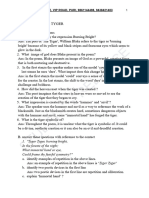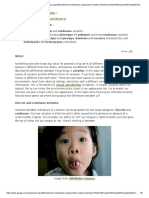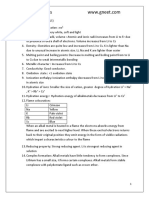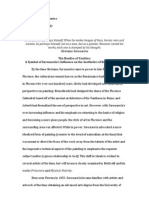100%(1)100% found this document useful (1 vote)
3K viewsThe Send Off Notes
The Send Off Notes
Uploaded by
SabsThis document provides background information and analysis of Wilfred Owen's poem "The Send-Off". The poem depicts a group of soldiers being sent off to war amid propaganda and staged celebrations, while hinting at the grim reality of what awaits them. Through its use of imagery and tone, the poem contrasts the propaganda-fueled enthusiasm of the send-off with the secrecy, detachment and lack of care from the government. It also contrasts the soldiers' expectations of returning home with the likelihood that only a few, if any, will survive to return.
Copyright:
© All Rights Reserved
Available Formats
Download as DOCX, PDF, TXT or read online from Scribd
The Send Off Notes
The Send Off Notes
Uploaded by
Sabs100%(1)100% found this document useful (1 vote)
3K views4 pagesThis document provides background information and analysis of Wilfred Owen's poem "The Send-Off". The poem depicts a group of soldiers being sent off to war amid propaganda and staged celebrations, while hinting at the grim reality of what awaits them. Through its use of imagery and tone, the poem contrasts the propaganda-fueled enthusiasm of the send-off with the secrecy, detachment and lack of care from the government. It also contrasts the soldiers' expectations of returning home with the likelihood that only a few, if any, will survive to return.
Original Description:
IB english
Copyright
© © All Rights Reserved
Available Formats
DOCX, PDF, TXT or read online from Scribd
Share this document
Did you find this document useful?
Is this content inappropriate?
This document provides background information and analysis of Wilfred Owen's poem "The Send-Off". The poem depicts a group of soldiers being sent off to war amid propaganda and staged celebrations, while hinting at the grim reality of what awaits them. Through its use of imagery and tone, the poem contrasts the propaganda-fueled enthusiasm of the send-off with the secrecy, detachment and lack of care from the government. It also contrasts the soldiers' expectations of returning home with the likelihood that only a few, if any, will survive to return.
Copyright:
© All Rights Reserved
Available Formats
Download as DOCX, PDF, TXT or read online from Scribd
Download as docx, pdf, or txt
100%(1)100% found this document useful (1 vote)
3K views4 pagesThe Send Off Notes
The Send Off Notes
Uploaded by
SabsThis document provides background information and analysis of Wilfred Owen's poem "The Send-Off". The poem depicts a group of soldiers being sent off to war amid propaganda and staged celebrations, while hinting at the grim reality of what awaits them. Through its use of imagery and tone, the poem contrasts the propaganda-fueled enthusiasm of the send-off with the secrecy, detachment and lack of care from the government. It also contrasts the soldiers' expectations of returning home with the likelihood that only a few, if any, will survive to return.
Copyright:
© All Rights Reserved
Available Formats
Download as DOCX, PDF, TXT or read online from Scribd
Download as docx, pdf, or txt
You are on page 1of 4
Ardon M Pillay
The Send Off Notes
Features
Background
Written 1918 in Craiglockhart, while Owen was recovering from shell-
shock
Written from the perspective of an onlooker
He wrote it to express the tragedy and futility of war
Published posthumously, people who lost family and friends in the war
read it, but it drew criticism from others who said the poems failed to
discuss other aspects of war like camaraderie and acts of bravery.
General
Themes: Propaganda vs Reality, Secrets and conspiracies
Tone: Morose, depressed
Poem starts on a negative note immediately
Owen wanted to show readers the difference between propaganda and
reality as well as to discourage people from enlisting
Audience
People who were strongly anti-war, as Owen’s poetry communicated this
very well to them
This is shown through the use of Owens poetry in the 1960s in anti war
movements in the USA
Line by Line Analysis
Down the close, darkening lanes they sang their way
“Down,” and “close,” have negative connotations, down is used to
describe depression and close connotes oppression
Darkening – diction – shows how the road ahead only gets darker (worse)
“sang,” – diction – despite their surroundings, the men are happy (sang
connotes happiness), this juxtaposes the morose atmosphere presented
To the siding-shed,
imagery of siding shed shows how the men are being treated as
commodities, as a siding shed is where goods are stored
The alliteration of the s letter imitates whispers, creating the idea of a
secret being withheld
Siding shed is also at the very end of the train, this could reflect how the
men are nearly at the end of their lives
And lined the train with faces grimly gay.
“lined,” –diction- suggests organisation, hence implying that this send off
is not as genuine as it seems, alluding to the idea that the government
has deliberately staged the send off in this way to keep the secret
Ardon M Pillay
grimly gay – oxymoron, gay is happy and grimly connotes negative
emotions, this could express how on the surface the soldiers are happy to
go to war, but are secretly upset about it. It could also mean that they are
happy for now, but will not be happy when they reach the battlefield and
confront the reality of war. G alliteration emphasises this
Their breasts were stuck all white with wreath and spray
“stuck,” – diction – could refer to stuck in the bullet sense, representing
death
The running theme here is white with lots of decoration (wreath and
spray), this is ambiguous as it could be a funeral as well as a celebration,
this shows how the funerals of the men will follow shortly after they leave.
As men's are, dead.
Confirms and reinforces the idea of a funeral
Dramatic pause through the caesura to emphasise how the sadness of it, a
morbid word on a joyous occasion. This represents the sadness of the
soldiers’ death (PLEASE SEE MS OXLEY)
Dull porters watched them, and a casual tramp
“dull,” – diction – because of the number of times the porters have seen
“send offs,” emphasises the repetitiveness of this exercise, not just a one
time thing. Their dullness juxtaposes the soldier’s apparent enthusiasm
Stood staring hard,
“stood staring,” sibilance – emphasises the whispers of the government –
allusion to the secret of war being held and kept by the government
Sorry to miss them from the upland camp.
“sorry,” – feelings of regret, ironic that the tramp feels sad for soldiers,
and the government does not despite them sending them off to their
deaths
Then, unmoved, signals nodded, and a lamp
“unmoved,” diction- lack of emotion, atmosphere becomes more sinister
as soon as the soldiers leave, support idea that the send off was very
forced and put on
“signals nodded,” – personification – all part of a secret conspiracy
Winked to the guard.
“Winked at the guard,” – personification – all part of a secret conspiracy
Ardon M Pillay
So secretly, like wrongs hushed-up, they went.
S sibilance once again emphasises the idea of a secret being kept
The use of the word secret makes it seem that we will soon know the
secret, perhaps when the soldiers go onto the battlefield
The wrongs are part of the secret and the use of the word “hushed”
implies that the government are treating soldiers as children as you
would tell a child to hush, but not an adult. Demeaning nature of
government
“they went,” at the end of the caesura, at the end of the sentence, like it is
the last thing the soldiers will ever do
They were not ours:
“they,” diction – collective term for soldiers, lack of identity when viewed
by government, seen as commodities
“ours” – personal pronoun used to show that the government has no
responsibility for them
We never heard to which front these were sent.
“these,” – sense of detachment through collective term, no identity, the
variation between they and these could also reflect the uncertainty of the
soldiers’ future?
Nor there if they yet mock what women meant
flowers given as in the hopes of peace on the battlefield, expresses hope
that the men would come home
Ironic because the men would never return, hence the flowers were
useless, hence the mocking by the soldiers once they reach the battlefield
Who gave them flowers.
Shall they return to beatings of great bells
“beating,” – diction- a violent word used in the place of ringing, used to
show the effect of war on the soldiers, such that they see anything as a
form of violence
“beatings of great bells,” –ambiguous, could be a celebration of the return
of soldiers or the funeral bells – reflect the expectations of war against the
reality of it
In wild trainloads?
Ardon M Pillay
“wild,” – diction – denotes an abundance of animalistic behaviour,
expressing how the soldiers lose human qualities during war. This creates
the idea that the secret being kept is the true nature of war
A few, a few, too few for drums and yells,
Repetition of soft sounds “a few, a few, too few,” create a morose tone,
emphasising how sad it is that only a few soldiers return
“for drums and yells,” juxtaposed to the great bells line, further
expressing how the soldiers expectations are very different to reality
May creep back, silent, to still village wells
“silent,” juxtaposed to the bells and yells presented in earlier line “great
bells.” – reinforce idea of unrealistic expectations. Also represents how
the soldiers don’t want to talk about their experiences in war, links to the
use of the word lame in Ducle, as it was used
“creep,” – diction- suggests poor physical state that results in impaired
movement or could represent the emotional impact of war on the
soldiers, hence they “creep,” with sadness, rather than walk. Also
connotes moving silently, s0 noone will see them, reference to guilt of
soldeirs
“still village wells,” – symbol of the home and peaceful subsistence, links
to how ironically, the soldiers will never reach the well?
Up half-known roads.
“half known,” phrase references how
You might also like
- The Elevator: PART A: Comprehension QuestionsDocument6 pagesThe Elevator: PART A: Comprehension QuestionsWaris Ahmad100% (1)
- My Greatest Olympic PrizeDocument14 pagesMy Greatest Olympic Prizehwlloo knfdNo ratings yet
- Tales For Change - Margaret ParkinDocument169 pagesTales For Change - Margaret Parkinreeeky2001No ratings yet
- The Girl Who CanDocument4 pagesThe Girl Who CanMadhu50% (4)
- A Doctor JournalDocument4 pagesA Doctor JournalARCHANNAA100% (1)
- The Good Old-Fashioned War: John Brown As An Anti-War Lyric Theme of False Romanticisation of WarDocument4 pagesThe Good Old-Fashioned War: John Brown As An Anti-War Lyric Theme of False Romanticisation of WarVijay Kumar100% (3)
- Bangle SellersDocument3 pagesBangle SellersArijit Roy50% (2)
- Night MailDocument4 pagesNight MailRamsha Tjw100% (2)
- Strange Meeting NotesDocument9 pagesStrange Meeting NotesSabsNo ratings yet
- Chemistry 1C - Specimen PaperDocument32 pagesChemistry 1C - Specimen PaperSabs60% (5)
- Strange Meeting NotesDocument9 pagesStrange Meeting NotesSabsNo ratings yet
- Rubrics For Recitation of RhymeDocument1 pageRubrics For Recitation of RhymeSabs100% (2)
- TN Gov Regulations For Playschool 2015 PDFDocument12 pagesTN Gov Regulations For Playschool 2015 PDFSabs50% (2)
- Ethan From LITPLAN Teaching UnitDocument188 pagesEthan From LITPLAN Teaching UnitLisa Ward100% (1)
- Medicinal Plants in MalayalamDocument122 pagesMedicinal Plants in Malayalamprofptrajasekharan78% (9)
- The Send Off (Poem) NotesDocument5 pagesThe Send Off (Poem) Noteskrishshanthb100% (5)
- The Send OffDocument3 pagesThe Send Offshreya gualti100% (2)
- The Girl Who Can - Long NotesDocument3 pagesThe Girl Who Can - Long NotesAnimesh BhakatNo ratings yet
- Isc Comprehension Practice 1Document2 pagesIsc Comprehension Practice 1Meetika Malhotra0% (2)
- The Owl - Philip Edward ThomasDocument2 pagesThe Owl - Philip Edward ThomasTaibur Rahaman100% (3)
- A Work of ArtificeDocument2 pagesA Work of ArtificeAnthony Laskowski100% (1)
- Strange Meeting ThemesDocument2 pagesStrange Meeting ThemesNur Nabila Natasya RazifNo ratings yet
- Find O'ce Space - Super Fast: The Night Mail Question AnswersDocument1 pageFind O'ce Space - Super Fast: The Night Mail Question AnswersrishantolaniNo ratings yet
- Upon Westminster BridgeDocument11 pagesUpon Westminster Bridgecrazyindiangamer.krunal195No ratings yet
- I Remember I Remember Workbook NotesDocument12 pagesI Remember I Remember Workbook NotesNight KingerNo ratings yet
- 8 - English-Refugee Blues-NotesDocument6 pages8 - English-Refugee Blues-NotesMuhammad Shahid Ashraf100% (2)
- Bonku Babu NotesDocument15 pagesBonku Babu NotesThe Two side ShowNo ratings yet
- A Doctor's Journal Entry For August 6, 1945Document3 pagesA Doctor's Journal Entry For August 6, 1945Rajeev Kakkar60% (5)
- THE STAG - Class NotesDocument3 pagesTHE STAG - Class Notesmishka100% (1)
- Abou Ben AdhemDocument19 pagesAbou Ben AdhemNASA LIFENo ratings yet
- STRANGE MEETING An Analysis byDocument9 pagesSTRANGE MEETING An Analysis byshilajit biswas100% (1)
- Oliver Asks For MoreDocument9 pagesOliver Asks For MoreDebarati Paul100% (1)
- Possible Questions of B. WordsworthDocument1 pagePossible Questions of B. WordsworthShailjaNo ratings yet
- 7 Icse TygerDocument2 pages7 Icse TygerraniadwellsNo ratings yet
- Strange MeetingDocument21 pagesStrange MeetingXari PariNo ratings yet
- Telephone Conversation and Cookie Lady Test AnswersDocument3 pagesTelephone Conversation and Cookie Lady Test AnswerssaketmkanagalNo ratings yet
- I Remember I Remember Class 9 Icse Workbook AnswersDocument8 pagesI Remember I Remember Class 9 Icse Workbook Answersavantikaa.baid100% (2)
- Julius Caesar Act 1 Scene 1 MC QDocument5 pagesJulius Caesar Act 1 Scene 1 MC QSandhya Ramesh100% (3)
- Exploring The Themes of True Love and Vanity in The Glove and LionsDocument8 pagesExploring The Themes of True Love and Vanity in The Glove and Lionsarpandash83100% (2)
- Grade 8 NotesDocument9 pagesGrade 8 NotesGeetha.H.R 9th G.H.S.Honsigere100% (1)
- W. H. Auden: Poems Summary and Analysis of "Night Mail"Document2 pagesW. H. Auden: Poems Summary and Analysis of "Night Mail"Akram Saqib80% (5)
- The Darkling Thrush - Sample AnswerDocument1 pageThe Darkling Thrush - Sample Answersd100% (2)
- 10 - Advice To YouthDocument3 pages10 - Advice To Youthapi-309434036No ratings yet
- An Early Morning SceneDocument2 pagesAn Early Morning Scenedaraumang63% (8)
- Death of NaturalistDocument9 pagesDeath of NaturalistDana KhairiNo ratings yet
- The Charge of The Light Brigade Model Questions and Suggested AnswersDocument4 pagesThe Charge of The Light Brigade Model Questions and Suggested AnswersJohn wayneNo ratings yet
- Night Mail Class 9 Icse Workbook AsnwersDocument9 pagesNight Mail Class 9 Icse Workbook Asnwersavantikaa.baidNo ratings yet
- Poetic and Language Techniques in Strange MeetingDocument5 pagesPoetic and Language Techniques in Strange MeetingL100% (3)
- REFUGEE BLUES Extra Q&ADocument3 pagesREFUGEE BLUES Extra Q&Aayan5913No ratings yet
- The Listeners Poem Summary - Questions and Answers Class 11 AHSECDocument5 pagesThe Listeners Poem Summary - Questions and Answers Class 11 AHSECkoushick_123No ratings yet
- In The Woods On A Windy Day Q AnsDocument3 pagesIn The Woods On A Windy Day Q AnsRuby Sisodiya0% (2)
- Skimbleshanks Class 9 Icse Workbook AnswersDocument9 pagesSkimbleshanks Class 9 Icse Workbook Answersavantikaa.baidNo ratings yet
- An Irish Airman Foresees His Death AnalysisDocument11 pagesAn Irish Airman Foresees His Death Analysissouhitya debsharmaNo ratings yet
- Notes - The Homecoming - by Rabindranath TagoreDocument3 pagesNotes - The Homecoming - by Rabindranath Tagoreprad100% (1)
- Wole Soyinka Telephone Conversation NotesDocument3 pagesWole Soyinka Telephone Conversation NotesSWARNAV BISWAS 22212078No ratings yet
- Tempest Act IV Summary and Long Answers QuestionsDocument3 pagesTempest Act IV Summary and Long Answers QuestionsRiddhi MhaskarNo ratings yet
- Treasure Trove Workbook Answers After BlenhiemDocument46 pagesTreasure Trove Workbook Answers After BlenhiemHarini100% (3)
- B.Wordsworth by V.S Naipaul - LitbugDocument13 pagesB.Wordsworth by V.S Naipaul - LitbugGulendra Lakhwani100% (1)
- The Village SchoolmasterDocument3 pagesThe Village SchoolmasterPiku Choudhury80% (5)
- A Girls Who CanDocument2 pagesA Girls Who CanWaham Areum100% (1)
- St. Mary'S English School: Class - Xi Subject - English Literature CH - The Great Automatic GrammatizatorDocument8 pagesSt. Mary'S English School: Class - Xi Subject - English Literature CH - The Great Automatic GrammatizatorWindows AjsNo ratings yet
- Why I Like The Hospital - PoemDocument2 pagesWhy I Like The Hospital - Poem6557.astro50% (2)
- Three Questions' by Leo Tolstoy - Questions and Answers (S.a.Q.), Class 12, WBCHSEDocument11 pagesThree Questions' by Leo Tolstoy - Questions and Answers (S.a.Q.), Class 12, WBCHSEsomgoindia9No ratings yet
- 7-English-In The Bazaars of Hyderabad & Grammar-NotesDocument12 pages7-English-In The Bazaars of Hyderabad & Grammar-NotesJayaNo ratings yet
- Finding Sense Behind Nonsense in Select Poems of Sukumar RayDocument10 pagesFinding Sense Behind Nonsense in Select Poems of Sukumar RayRindon KNo ratings yet
- Work of Artifice Question AnswersDocument6 pagesWork of Artifice Question Answersavantikaa.baidNo ratings yet
- 5 Variation InheritanceDocument8 pages5 Variation InheritanceSabsNo ratings yet
- Class 4 English Sa 2Document6 pagesClass 4 English Sa 2SabsNo ratings yet
- Class 3 Eng Sa2 PDFDocument9 pagesClass 3 Eng Sa2 PDFSabsNo ratings yet
- Guidelines For Setting Questions IN English: D:/Three/Cbse/Sqp Dass/EnglishDocument2 pagesGuidelines For Setting Questions IN English: D:/Three/Cbse/Sqp Dass/EnglishSabsNo ratings yet
- JEH01 English MS Year6 2013juneDocument16 pagesJEH01 English MS Year6 2013juneSabs100% (2)
- Year 7 Student Book Sample - 7IADocument5 pagesYear 7 Student Book Sample - 7IASabs100% (1)
- JEH01 English QP Year6 2012juneDocument16 pagesJEH01 English QP Year6 2012juneSabs0% (1)
- International Primary Curriculum English Year 3 Mark SchemeDocument14 pagesInternational Primary Curriculum English Year 3 Mark SchemeSabs100% (1)
- JEH01 English MS Year6 2012juneDocument12 pagesJEH01 English MS Year6 2012juneSabsNo ratings yet
- Nazi Party - Wilderness YearsDocument4 pagesNazi Party - Wilderness YearsSabsNo ratings yet
- Subjects Choice For Grade 9 - Igcse Edexcel (5 Subjects With Eng & Math)Document1 pageSubjects Choice For Grade 9 - Igcse Edexcel (5 Subjects With Eng & Math)SabsNo ratings yet
- English Assessment PrimaryDocument3 pagesEnglish Assessment PrimarySabs0% (1)
- Chemical Bonding - FINALDocument9 pagesChemical Bonding - FINALSabsNo ratings yet
- Igcse: Art and Design: Fine Art, Graphic Design, Photography, TextilesDocument24 pagesIgcse: Art and Design: Fine Art, Graphic Design, Photography, TextilesSabsNo ratings yet
- Assessment Rubric IOCDocument1 pageAssessment Rubric IOCSabs100% (1)
- Science Worksheet Nutrition in AnimalsDocument1 pageScience Worksheet Nutrition in AnimalsSabsNo ratings yet
- I.B. Literary Devices For Wilfred OwenDocument4 pagesI.B. Literary Devices For Wilfred OwenSabsNo ratings yet
- WCC Prospectus 2016-17Document28 pagesWCC Prospectus 2016-17SabsNo ratings yet
- Historical Knowledge Is Limited by Incompleteness of The RecordDocument26 pagesHistorical Knowledge Is Limited by Incompleteness of The RecordGjianne Caubang MalikNo ratings yet
- Personal Information QuestionsDocument1 pagePersonal Information QuestionsJose Armando Romero50% (2)
- Detailed Estimate of Building: Sl:No Items of Work No L B H QtyDocument9 pagesDetailed Estimate of Building: Sl:No Items of Work No L B H Qtyaarathy mayaNo ratings yet
- أسئلة مراجعة على محاضرات الشعر الانجليزي ..Document67 pagesأسئلة مراجعة على محاضرات الشعر الانجليزي ..papar58954No ratings yet
- Riddles About Parts of BodyDocument5 pagesRiddles About Parts of BodyDio Nia100% (1)
- Hittite WitchcraftDocument26 pagesHittite WitchcraftIske Sabiha100% (1)
- Super Ultimate Portrait Pack: Baldur's Gate I & II (BGI & BGII) - With The Release of Baldur's Gate: Enhanced EditionDocument3 pagesSuper Ultimate Portrait Pack: Baldur's Gate I & II (BGI & BGII) - With The Release of Baldur's Gate: Enhanced EditionJuan AlemaniNo ratings yet
- Direct Indirect NurohmahDocument12 pagesDirect Indirect Nurohmahrecky ernawanNo ratings yet
- S - Block ElementsDocument23 pagesS - Block ElementsAnand MurugananthamNo ratings yet
- Workout Schedule: Day 2 Day 3 Day 4 Day 5 Day 6 Day 7Document2 pagesWorkout Schedule: Day 2 Day 3 Day 4 Day 5 Day 6 Day 7Andrea BallaNo ratings yet
- FP (Tech.) - FS - SET A-2016Document3 pagesFP (Tech.) - FS - SET A-2016ARYAN RATHORENo ratings yet
- The Bonfire of VanitiesDocument11 pagesThe Bonfire of Vanitiesapi-199779087No ratings yet
- FR0396Document16 pagesFR0396Frankcw1No ratings yet
- Pbt-Toefl, Cbt-Toefl & Ibt-Toefl Pbt-Toefl, Cbt-Toefl & Ibt-ToeflDocument3 pagesPbt-Toefl, Cbt-Toefl & Ibt-Toefl Pbt-Toefl, Cbt-Toefl & Ibt-ToeflDjazairi 213No ratings yet
- Journal of Graphic Novels & Comics: Publication Details, Including Instructions For Authors and Subscription InformationDocument20 pagesJournal of Graphic Novels & Comics: Publication Details, Including Instructions For Authors and Subscription Informationyuna_sr100% (1)
- 29 Motivational QuotesDocument1 page29 Motivational QuotesZohaib HussainNo ratings yet
- Passive Voice 15680Document2 pagesPassive Voice 15680Ngoại Ngữ LeeNo ratings yet
- Marvel Age 29Document21 pagesMarvel Age 29Panini Comics España50% (2)
- Soal UTS Bahasa Inggris SD Semester Genap Kelas 3Document5 pagesSoal UTS Bahasa Inggris SD Semester Genap Kelas 3Katering Warkop Retro100% (2)
- Maquet XtenDocument16 pagesMaquet XtenDUENDAONo ratings yet
- Pachelbel's Christmas PreludeDocument5 pagesPachelbel's Christmas PreludeJoy NiloNo ratings yet
- Moment of InertiaDocument17 pagesMoment of Inertiasubhankarsarthak1100% (1)
- Options and Choices in Musical Film Lyrics Translation - DP - Hana - MekinovaDocument89 pagesOptions and Choices in Musical Film Lyrics Translation - DP - Hana - Mekinovaafb4No ratings yet
- Wave 1 - 5 UsersDocument24 pagesWave 1 - 5 UsersCarlos Alberto Castillo BetancourtNo ratings yet
- Niranjan Babu Banglore 1Document9 pagesNiranjan Babu Banglore 1sumshe1984No ratings yet
- Automatic Rectification of Perspective Distortion From A Single Image Using Plane Homography PDFDocument12 pagesAutomatic Rectification of Perspective Distortion From A Single Image Using Plane Homography PDFAnonymous lVQ83F8mCNo ratings yet
- Drama in Western CultureDocument1 pageDrama in Western CultureAlexand85No ratings yet














































































































